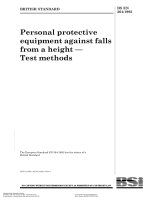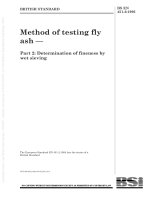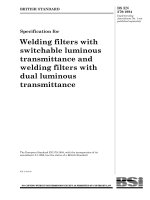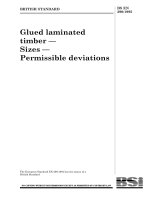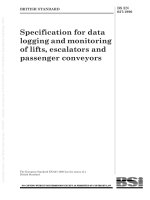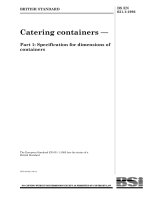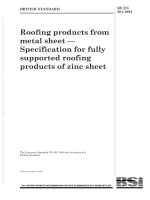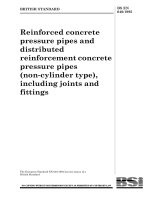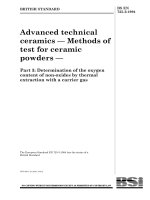Bsi bs en 00477 1999
Bạn đang xem bản rút gọn của tài liệu. Xem và tải ngay bản đầy đủ của tài liệu tại đây (124.61 KB, 8 trang )
BRITISH STANDARD
Unplasticized
polyvinylchloride (PVC-U)
profiles for the fabrication of
windows and doors Ð
Determination of the
resistance to impact of main
profiles by falling mass
The European Standard EN 477:1995 has the status of a
British Standard
ICS 83.140.99
NO COPYING WITHOUT BSI PERMISSION EXCEPT AS PERMITTED BY COPYRIGHT LAW
|
|
|
|
|
|
|
|
|
|
|
|
|
|
|
|
|
|
|
|
|
|
|
|
|
|
|
|
|
|
|
|
|
|
|
|
|
|
|
|
|
|
|
|
|
|
|
|
|
|
|
|
|
|
|
|
|
|
|
|
|
|
|
|
|
|
|
|
|
|
|
|
|
|
|
|
|
|
|
|
|
|
|
|
|
|
|
|
|
|
|
|
|
|
|
|
|
|
|
|
|
|
|
|
|
|
|
|
|
|
|
|
|
|
|
|
|
|
|
|
|
|
|
|
|
|
|
|
|
BS EN
477:1999
BS EN 477:1999
National foreword
This British Standard is the English language version of EN 477:1995.
The UK participation in its preparation was entrusted by Technical Committee
B/538, Doors, windows, shutters, hardware and curtain walling, to Subcommittee
B/538/1, Windows, which has the responsibility to:
Ð aid enquirers to understand the text;
Ð present to the responsible international/European committee any enquiries
on the interpretation, or proposals for change, and keep the UK interests
informed;
Ð monitor related international and European developments and promulgate
them in the UK.
A list of organizations represented on this subcommittee can be obtained on request
to its secretary.
This British Standard forms part of a package of standards on unplasticized
polyvinylchloride (PVC-U) profiles for the fabrication of windows and doors which
will not become fully effective until all standards in the package have been
published and any superseded standards have been withdrawn. The date of
withdrawal for national standards will be agreed within CEN and will be notified.
Cross-references
The British Standards which implement international or European publications
referred to in this document may be found in the BSI Standards Catalogue under the
section entitled ªInternational Standards Correspondence Indexº, or by using the
ªFindº facility of the BSI Standards Electronic Catalogue.
A British Standard does not purport to include all the necessary provisions of a
contract. Users of British Standards are responsible for their correct application.
Compliance with a British Standard does not of itself confer immunity
from legal obligations.
Summary of pages
This document comprises a front cover, an inside front cover, the EN title page,
pages 2 to 5 and a back cover.
This British Standard, having
been prepared under the
direction of the Sector
Committee for Building and Civil
Engineering, was published under
the authority of the Standards
Committee and comes into effect
on 15 May 1999
BSI 05-1999
ISBN 0 580 32276 9
Amendments issued since publication
Amd. No.
Date
Text affected
EN 477
EUROPEAN STANDARD
NORME EUROPÊENNE
EUROPẰISCHE NORM
May 1995
ICS 83.140; 91.060.50
Descriptors: buildings, windows, non-metallic sections, unplasticized polyvinylchloride, impact tests, shock resistance
English version
Unplasticized polyvinychloride (PVC-U) profiles for the fabrication
of windows and doors Ð Determination of the resistance to impact
of main profiles by falling mass
ProfileÂs de polychlorure de vinyle non plastifieÂ
(PVC-U) pour la fabrication des feneÃtres et des
portes Ð DeÂtermination de la reÂsistance aux chocs
par masse tombante des profileÂs principaux
Profile aus weichmacherfreiem Polyvinylchlorid
(PVC-U) zur Herstellung von Fenstern und TuÈren Ð
Bestimmung der Stoûfestigkeit von Hauptprofilen
mittels Fallbolzen
This European Standard was approved by CEN on 1995-05-02. CEN members are
bound to comply with the CEN/CENELEC Internal Regulations which stipulate the
conditions for giving this European Standard the status of a national standard
without any alteration.
Up-to-date lists and bibliographical references concerning such national standards
may be obtained on application to the Central Secretariat or to any CEN member.
This European Standard exists in three official versions (English, French, German).
A version in any other language made by translation under the responsibility of a
CEN member into its own language and notified to the Central Secretariat has the
same status as the official versions.
CEN members are the national standards bodies of Austria, Belgium, Denmark,
Finland, France, Germany, Greece, Iceland, Ireland, Italy, Luxembourg, Netherlands,
Norway, Portugal, Spain, Sweden, Switzerland and United Kingdom.
CEN
European Committee for Standardization
Comite EuropeÂen de Normalisation
EuropaÈisches Komitee fuÈr Normung
Central Secretariat: rue de Stassart 36, B-1050 Brussels
1995 All rights of reproduction and communication in any form and by any means reserved in all countries to
CEN and its members.
Ref. No. EN 477:1995 E
Page 2
EN 477:1995
Foreword
This European Standard was prepared by the Technical
Committee CEN/TC 33, Windows, doors, shutters,
building hardware and curtain walling, of which the
Secretariat is held by AFNOR.
The requirements are incorporated in the product
standards concerned.
This European Standard will result in one of a series
of standards on test methods which supports a product
standard for PVC-U profiles for the fabrication of
windows and doors.
This European Standard shall be given the status of a
national standard either by publication of an identical
text or by endorsement, at the latest by
November 1995, and conflicting national standards
shall be withdrawn at the latest by November 1995.
According to the CEN/CENELEC Internal Regulations,
the following countries are bound to implement this
European Standard: Austria, Belgium, Denmark,
Finland, France, Germany, Greece, Iceland, Ireland,
Italy, Luxembourg, Netherlands, Norway, Portugal,
Spain, Sweden, Switzerland and the United Kingdom.
BSI 05-1999
Page 3
EN 477:1995
1 Scope
5 Test pieces
This European Standard specifies a method for the
determination of the resistance to impact by a falling
mass at 210 8C of unplasticized polyvinylchloride
(PVC-U) main profiles for the fabrication of windows
and doors for the assessment of the extrusion.
Ten test pieces, each of length of 300 mm shall be
taken from a main profile.
2 Principle
Test pieces cut from lengths of main profiles are
subjected to a blow from a mass falling from a known
height on the sight surface at a point mid-way between
two supporting webs at a fixed temperature.
After testing the profiles are examined visually for
failures.
3 Definitions
For the purpose of this European Standard the
following definitions apply.
3.1
main profile
profile, which has a load bearing function in the
construction of windows and doors
3.2
sight surface
face surface of a profile that is exposed to view, when
the window or door is closed
3.3
web
membrane connecting two walls of a profile
6 Conditioning
The test pieces shall be conditioned at a temperature
of (210220) 8C for at least 1 h before testing.
Each test piece shall be tested within 10 s of removal
from the conditioning chamber.
7 Procedure
7.1 The test shall be executed on the sight surface of
the main profile (preferably on the sight surface which
is designed to be exposed to the weather).
7.2 Drop the falling mass from the given height as
required in the product standard at a point mid-way
between two supporting webs.
NOTE 1 Where it is impracticable for the mass to hit the profile
in accordance with 7.2 due to its geometry, other impact positions
for the falling mass should be agreed upon between the profile
manufacturer and the testing laboratory.
NOTE 2 When due to its geometry, the profile tends to tilt
sideways at the impact of the falling mass, any tilting should be
prevented, by attaching additional stays to the two supports.
NOTE 3 During the test care should be taken to prevent multiple
impacts of the falling mass on the test piece.
8 Expression of results
The number of test pieces tested and the number of
test pieces broken shall be reported for each type of
main profile.
4 Apparatus
9 Test report
An impact testing machine, incorporating the
following basic components (see Figure 1) shall be
used:
a) main frame, rigidly fixed in the vertical position;
b) guide rails, fixed to the main frame to
accommodate the falling mass and allowing it to fall
freely in the vertical plane;
c) test piece support, consisting of a rounded off
support (see Figure 2) with a distance between
(200 ± 1) mm. The support shall be made from steel
and rigidly fixed in a solid foundation or on a table
with a mass of more than 50 kg;
d) release mechanism, such that the falling mass can
fall through a height which can be adjusted up to
(1 500+100 ) mm, measured from the top surface of the
test piece to be tested;
e) falling mass, of (1 000 ± 5) g, which has a
hemispherical striking surface of (25 ± 0,5) mm
radius.
The striking surface shall be free from all
imperfections.
The test report shall include the following information:
a) reference to this European Standard;
b) the testing laboratory;
c) full identification of the profile;
d) date of testing;
e) the height of the falling mass;
f) the number of test pieces tested;
g) the number of test pieces broken;
h) all operating details not specified in this
European Standard, as well as incidents likely to
have influenced the results.
BSI 05-1999
Page 4
EN 477:1995
KEY
1 Falling mass
Figure 1 Ð Example of impact resistance testing apparatus
BSI 05-1999
Page 5
EN 477:1995
Dimensions in millimetres
Figure 2 Ð Example of a supporting device
BSI 05-1999
BSI
389 Chiswick High Road
London
W4 4AL
|
|
|
|
|
|
|
|
|
|
|
|
|
|
|
|
|
|
|
|
|
|
|
|
|
|
|
|
|
|
|
|
|
|
|
|
|
|
|
|
|
|
|
|
|
|
|
|
|
|
|
|
|
|
|
|
|
|
|
|
|
|
|
|
|
|
|
|
|
|
|
|
|
|
|
|
|
|
|
|
|
|
|
|
|
|
|
|
|
|
|
|
|
|
|
|
|
|
|
|
|
|
|
|
|
|
|
|
|
|
|
|
|
|
|
|
|
|
|
|
|
|
|
|
|
|
|
BSI Ð British Standards Institution
BSI is the independent national body responsible for preparing British Standards. It
presents the UK view on standards in Europe and at the international level. It is
incorporated by Royal Charter.
Revisions
British Standards are updated by amendment or revision. Users of British Standards
should make sure that they possess the latest amendments or editions.
It is the constant aim of BSI to improve the quality of our products and services. We
would be grateful if anyone finding an inaccuracy or ambiguity while using this
British Standard would inform the Secretary of the technical committee responsible,
the identity of which can be found on the inside front cover. Tel: 020 8996 9000.
Fax: 020 8996 7400.
BSI offers members an individual updating service called PLUS which ensures that
subscribers automatically receive the latest editions of standards.
Buying standards
Orders for all BSI, international and foreign standards publications should be
addressed to Customer Services. Tel: 020 8996 9001. Fax: 020 8996 7001.
In response to orders for international standards, it is BSI policy to supply the BSI
implementation of those that have been published as British Standards, unless
otherwise requested.
Information on standards
BSI provides a wide range of information on national, European and international
standards through its Library and its Technical Help to Exporters Service. Various
BSI electronic information services are also available which give details on all its
products and services. Contact the Information Centre. Tel: 020 8996 7111.
Fax: 020 8996 7048.
Subscribing members of BSI are kept up to date with standards developments and
receive substantial discounts on the purchase price of standards. For details of
these and other benefits contact Membership Administration. Tel: 020 8996 7002.
Fax: 020 8996 7001.
Copyright
Copyright subsists in all BSI publications. BSI also holds the copyright, in the UK, of
the publications of the international standardization bodies. Except as permitted
under the Copyright, Designs and Patents Act 1988 no extract may be reproduced,
stored in a retrieval system or transmitted in any form or by any means ± electronic,
photocopying, recording or otherwise ± without prior written permission from BSI.
This does not preclude the free use, in the course of implementing the standard, of
necessary details such as symbols, and size, type or grade designations. If these
details are to be used for any other purpose than implementation then the prior
written permission of BSI must be obtained.
If permission is granted, the terms may include royalty payments or a licensing
agreement. Details and advice can be obtained from the Copyright Manager.
Tel: 020 8996 7070.
